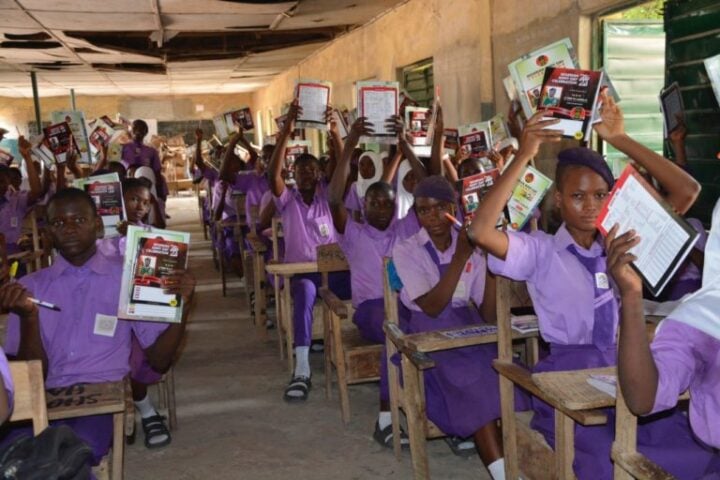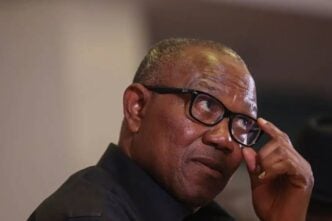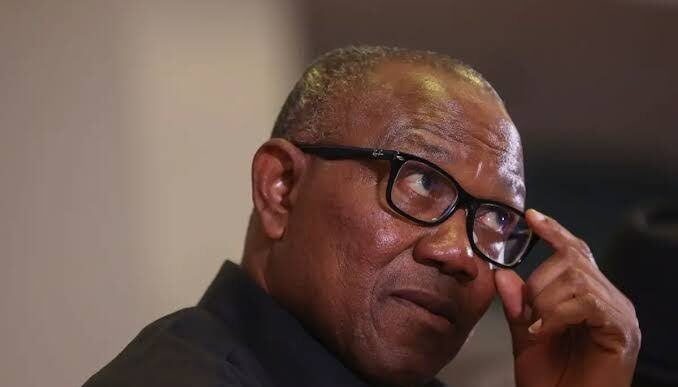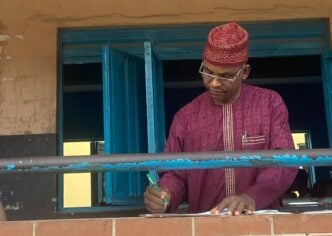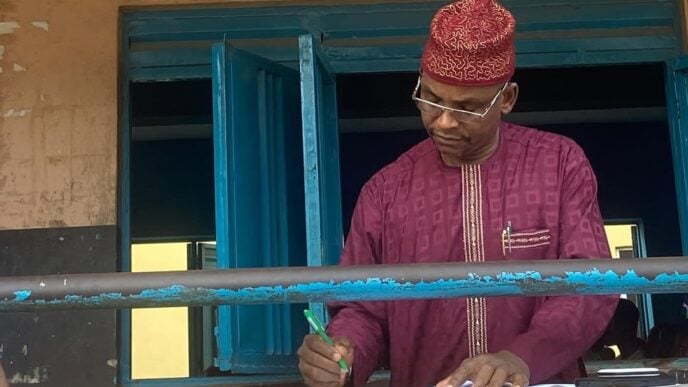Students at a Nigerian school.
History has returned as a subject in Nigeria’s basic school curriculum after nearly two decades since its removal.
The subject, education minister Tunji Alausa said, will be compulsory for all students from Primary 1 to Junior Secondary School 3.
He said the policy move is to nurture national identity, unity, patriotism, and responsible citizenship among young Nigerians.
The minister described history as not just a record of the past but also a “vital tool for shaping responsible and patriotic citizens.”
Advertisement
The novel history modules for Primary 1 to 6 is structured to include specific themes, learning outcomes, topics, and focal competencies.
It covers everything from Nigeria’s traditional power structures and state creation to colonial rule and nationalism.
For JSS 1 to 3, history will now be taking the form of civic and heritage studies.
Advertisement
It covers traditional occupations, civil rule, military governance, and the growth of industries in Nigeria.
On implementation, Alausa said the education ministry plans to retrain teachers and provide learning resources.
Nigeria operated different systems of education through the colonial and post-colonial era, all of which affected the teaching of history.
Until 1954, there was the 8-6-2-3 system (eight years of primary, six of secondary, two for high school certificate, and three of university).
Advertisement
Between 1954 to 1982, Nigeria adopted the 6-5-2-3 system, with history taught as a basic education subject in primary and junior schools.
After a national curriculum conference in 1969 and a 1980 directive on restructuring, Nigeria switched to the 6-3-3-4 system in 1982.
In-between, History was removed as a subject in JSS classes, replaced with Social Studies, and made optional in senior secondary.
In 2007, Nigeria launched a new curriculum known as the New Basic Education Curriculum for primary and Junior Secondary Schools.
Advertisement
At around this time, History was removed from primary and JSS curricula and implemented in the 2009/2010 academic session.
CDD reports that student apathy and a dearth of history teachers were cited at the time, with very few schools offering the subject.
Advertisement
By 2017, the Nigeria Education Research and Development Council (NERDC) disclosed it was set to reintroduce History as a subject.
In 2022, Nigeria initiated the first stage of teacher training to reintroduce History as a stand-alone subject in basic education curriculum.
Advertisement
This eventual curriculum rollout, in 2025, comes after 16 years since History was initially removed as a basic school subject.
See a breakdown of the curriculum below:
Advertisement
PRIMARY 1
| Theme | Learning Outcome | Topic(s) | Focal Competence | ||||||
| Origins and Peopling | Promoting national unity through tolerance for other ethnic groups. | Indigenous Peoples of the State | Identifying indigenous people of the community and promoting tolerance among ethnic groups. | ||||||
| Nigerian Peoples | Identifying and exhibiting tolerance for other ethnic groups in Nigeria. | ||||||||
| Geography and Environment | Exhibit the attitude of patriotism in a local and national context. | Major Towns in the State | Identifying towns for tourism and travel within the State. | ||||||
| Political Developments in Nigeria | Exhibit the attitude of patriotism and a sense of responsibility. | Heroes and Heroines in the State | Identifying heroes and heroines as an example of the spirit of service to the State. | ||||||
| Political Developments | Become informed and responsible citizens of the State. | History of the State | Appreciating the history of the State for responsible citizenship. | ||||||
| Become respectful to traditional rulers. | Major Traditional Authority in the State | Demonstrating respect for Traditional Authorities. | |||||||
PRIMARY 2
| Theme | Learning Outcome | Topic(s) | Focal Competence | ||||||
| Origins and Peopling | Promoting national unity through tolerance for other ethnic groups. | Indigenous Peoples of the State | Identifying indigenous people of the community and promoting tolerance among ethnic groups. | ||||||
| Nigerian Peoples | Identifying and exhibiting tolerance for other ethnic groups in Nigeria. | ||||||||
| Geography and Environment | Exhibit the attitude of patriotism in a local and national context. | Major Towns in the State | Identifying towns for tourism and travel within the State. | ||||||
| Political Developments in Nigeria | Exhibit the attitude of patriotism and a sense of responsibility. | Heroes and Heroines in the State | Identifying heroes and heroines as an example of the spirit of service to the State. | ||||||
| Political Developments | Become informed and responsible citizens of the State. | History of the State | Appreciating the history of the State for responsible citizenship. | ||||||
| Become respectful to traditional rulers. | Major Traditional Authority in the State | Demonstrating respect for Traditional Authorities. | |||||||
PRIMARY 3
| Theme | Learning Outcome | Topic(s) | Focal Competence | ||||||
| Origins and Peopling | Foster national unity through exhibiting tolerance for other ethnic groups. | Nigerian Peoples | Identifying other ethnic groups and promoting a sense of national unity. | ||||||
| Heroes and Heroines in Nigeria | Identify heroes and heroines and appreciate their contributions to national development and demonstrate selfless service. | Early Heroes and Heroines in Nigeria | Identifying national heroes and heroines who demonstrate the spirit of service to the community. | ||||||
| Geography and Environment | Appreciate the historical relevance of major towns. | Major Towns in Nigeria | Identifying towns in Nigeria for tourism and appreciating the history of the country. | ||||||
PRIMARY 4
| Theme | Learning Outcome | Topic(s) | Focal Competence | |
| Origins and Peopling | Promote national unity through exhibiting tolerance for other ethnic groups. | Nigerian Peoples; Nigerian Societies | Identifying other ethnic groups in Nigeria and developing a sense of national identity. | |
| Political Developments in Nigeria | Recognise/appreciate historical administrative changes in Nigeria’s political evolution. | Colonial Administrative Headquarters in Nigeria | Identifying the British Colonial Administrative Headquarters in Nigeria and their implications for citizenship. | |
| The Early Regions in Nigeria | Appreciating the implications of creating three regions. | |||
| States Creation in Nigeria | Identifying the implications of States creation and their effects on national unity and responsible citizenship. | |||
| Federal Capital Territory in Nigeria | Appreciating the implications of the creation of the FCT for national unity and becoming an informed and responsible citizen. | |||
| Geography and Environment | Demonstrate environment and historical and cultural sensitivity. | Historical Features and Sites in Nigeria | Recognising local historical features and artifacts for environmental literacy and cultural sensitivity. | |
| Historical features and sites in Nigeria | Recognising national historical features and artifacts for environmental literacy and cultural sensitivity in Nigeria. | |||
PRIMARY 5
| Political Developments in Nigeria | Demonstrate patriotism as citizens of Nigeria. | British Rule in Nigeria | Appreciating the end of colonial rule in Nigeria and developing a sense of patriotism. |
| Nationalism in Nigeria | Appreciating the role of becoming a nationalist. | ||
| Major Nationalists: Herbert Macaulay | Identifying Herbert Macaulay as a patriot and developing a sense of patriotism. | ||
| Dr. Nnamdi Azikiwe | Identifying Nnamdi Azikiwe as a patriot and developing a sense of patriotism. | ||
| Chief Obafemi Awolowo | Identifying Obafemi Awolowo as a patriot and developing a sense of patriotism. | ||
| Sir Ahmadu Bello | Identifying Sir Ahmadu Bello as a patriot and developing a sense of patriotism. | ||
| Mallam Aminu Kano | Identifying Mallam Aminu Kano as a patriot and developing a sense of patriotism. | ||
| Nigerian Independence | Demonstrating a sense of national pride and responsible citizenship in a united Nigeria. | ||
| Religions in Nigeria | Utilise the knowledge of religious tolerance to recognise and promote religious tolerance. | Traditional Religions in Nigeria | Recognising and appreciating traditional religion(s) in the locality. |
| Islam in Nigeria | Recognising and respecting Islam as a religion. | ||
| Christianity in Nigeria | Recognising and respecting Christianity as a religion. |
| Theme | Learning Outcome | Topic(s) | Focal Competence | ||||||
| Economy, Trade and Commerce | Recognise the importance of the Traditional Occupations of the locality and ways to Promote their Sustenance. | Traditional Occupations in the locality | Recognising the traditional occupations of the locality, and developing their interest to sustain them. | ||||||
| Traditional Occupations of the Hausa in the State | Recognising the traditional occupations of the Hausa people and developing interest in sustaining them. | ||||||||
| Traditional occupations of the Igbo people | Recognising the traditional occupations of the Hausa people and developing interest in sustaining them. | ||||||||
| Traditional Occupations of the Igbo people | Recognising the traditional occupations of the Igbo people and developing interest in sustaining them. | ||||||||
| Traditional Occupations of the Yoruba people | Identifying the traditional occupations of the Yoruba people and developing interest in sustaining them. | ||||||||
PRIMARY 6
| Theme | Learning Outcome | Topic(s) | Focal Competence | ||||||||
| Political Developments in Nigeria | Demonstrate patriotism and responsible citizenship. | Civil Rule in Nigeria | Highlighting civilian rule in Nigeria and the importance of patriotism and responsible citizenship. | ||||||||
| Military rule in Nigeria | Highlighting military rule in Nigeria and developing patriotism and responsible citizenship. | ||||||||||
| Economy, Trade and Commerce | Identify the importance of resource management and industrial growth for sustainability in economic. | Oil (Petroleum) Economy in Nigeria | Highlighting the importance of oil to the Nigerian economy, its efficient management and sustainable environment. | ||||||||
| Growth of Industries in Nigeria | Highlighting the importance of modern industries to the Nigerian economy, its efficient resource management and industrial growth. | ||||||||||
JUNIOR SECONDARY 1
| Theme | Learning Outcome | Topic(s) | Focal Competence | |||||
| Concept of History | Demonstrate knowledge of the meaning of history, historical sources and importance to informed decision making. | Meaning of History | Differentiating History from storytelling in decision making. | |||||
| Sources of History | Identifying sources of history for informed decision making. | |||||||
| Importance of History | Differentiating History and its application in decision making in everyday life. | |||||||
| Major Early Civilisations of the Nigerian peoples | Appreciate the Nok, Ife-Ife, Benin, Igbo-Ukwu and other cultures/civilisations as national heritage. | The Nok Culture | Recognising the Nok culture/civilisation as a national heritage. | |||||
| Ife-Ife Civilisation | Recognising the Ife-Ife culture/civilisation as a national heritage. | |||||||
| Benin Civilisation | Recognising the Benin culture/civilisation as a national heritage. | |||||||
| Igbo-Ukwu Civilisation | Recognising the Igbo-Ukwu culture/civilisation as a national heritage. | |||||||
| Political Developments in Nigeria | Appreciate pre-colonial and centralised achievements in state formation. | Major Centralised States in Pre-colonial Nigeria | Recognising the political structures and achievements in establishing centralised states. | |||||
JUNIOR SECONDARY 2
| Theme | Learning Outcome | Topic(s) | Focal Competence | |||||||
| Political Developments in Nigeria | Appreciate pre-colonial and centralised achievements in state formation. | Non-Centralised States in the Pre-colonial Nigeria | Recognising the political structures and achievements in establishing non-centralised states. | |||||||
| Appreciate the various types of inter-group relationships between pre-colonial Nigerian states in the pre-colonial period. | Inter-relationships between States | Promoting inter-community tolerance and peace in the relationships that existed between states in pre-colonial period. | ||||||||
| Geography, History and Environment | Demonstrate a sense of belonging by appreciating achievements of West African empires in early times (Ghana, Mali, Songhai Empires) | Ghana Empire | Appreciating the Ghana Empire in relation to modern development. | |||||||
| Mali Empire | Appreciating the Mali Empire in relation to modern development. | |||||||||
| Songhai Empire | Appreciating the Songhai Empire in relation to modern development. | |||||||||
JUNIOR SECONDARY 3
| Theme | Learning Outcome | Topic(s) | Focal Competence | ||||||
| External Contacts and Trade | Appreciate the impact of globalisation in African History. | Trans-Saharan Trade | Recognising the effects of Trans-Saharan trade and the processes of globalisation. | ||||||
| Early European contacts with Nigeria | Appreciating the early contact with Europe as an agent of socio-economic change. | ||||||||
| Political Developments in Nigeria | Exhibit the spirit of Patriotism. | British Conquest/ Colonisation of Nigerian Territories | Recognising the processes of the colonisation of Nigeria and be proud of our resistance to the conquest. | ||||||
| British Colonial Administration in Nigeria | Appreciating the impact and legacies of colonialism on Nigeria’s political structures. | ||||||||
| The Amalgamation of Nigeria | Appreciating the amalgamation of Nigeria to develop a sense of national unity and commitment. | ||||||||
| The Nationalist/Independence Movement | Appreciating and celebrating our nationalists and exhibiting the spirit of patriotism. | ||||||||

